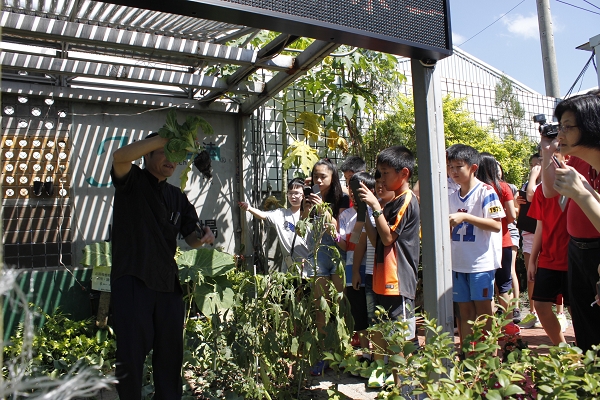Sponge City
In Mr. Jui-Wen Chen’s opinion, one must have a comprehensive approach in order to find a solution to reducing air pollution, the heat island effect, flooding, and drought altogether. Therefore, the JW Eco-Technology is designed with all of these issues taken into consideration. Mr. Chen not only wants to design a new type of pavement, but he also wants to incorporate his JW Eco-Technology into other aspects of urban planning. He wants to build a city with low heat island effect, a low level of pollution, and a good measure for flood and drought prevention – he wants to build a city which he calls “the Sponge City.”

The various aspects of the Jui-Wen Chen’s urban planning include retaining walls, waterway, pavement, aquaculture fishery, farming irrigation, and urban farmland.
1. Retaining Walls
Within a city, the area near the mountainside is where mudslides are most likely to happen. The use of the JW Eco-Technology in the retaining wall will stabilize the slope and the soil pressure as the Aqueduct Grate and the reinforced concrete provide structural support. At the same time, the application of the Aqueduct Assembly will help drain out water to prevent mudslides. By incorporating ecological engineering into the retaining wall structure, such as adding pots of plants on the front end of the Aqueduct Assembly, the plants can thrive on the mountainside; this will allow the soil to retain more water and keep the soil in place, not to mention that it would make the retaining walls more beautiful as well.
2. Waterway
Using the JW Eco-Technology to build the waterway will allow the soil around the waterway to retain water, thus, helping the exchange of the surface water and groundwater. The pots of plants on the walls of the waterway can smooth the current and create a place for marine life, such as fish, shrimp, crabs, and other aquatic animals to thrive on.
3. Pavement
The JW Eco-Technology Pavement does not have a drainage system. All the water is stored in the soil below. The road acts like a natural reservoir. It is durable, causes no pollution, and even provides us with water when needed.
4. Aquaculture Fishery
A normal aquaculture fishery farm needs to replace 5% of its water daily in order to keep the water clean and fresh. Using the JW Eco-Technology, the dirty water from the farm can get filtered through the JW Pavement. The clean water will drain into the underground storage tank and be reused in the farm. By recycling and reusing the water, there will be fewer problems with overdrafting groundwater.
5. Farming Irrigation
The JW Eco-Technology can also greatly benefit irrigation in places with limited water resource. When using the JW Eco-Technology on the roads and tracks around the farms, the land will become a reservoir all by itself. Farmers can have a constant supply of water and have no need to extract as much groundwater as they had before.
6. Urban Farmland
The land around the applications of the JW Eco-Technology can become farmlands simply by adding pots for plants. People can use places like balconies, rooftops, the sides of the roads, parking lots to plant and build their own farms near their homes.

The JW Eco-Technology can be applied to all corners of the city. Through its comprehensive design and a wide range of applications, we can see that Mr. Jui-Wen Chen has a great passion for preserving beauty and nature in our world. He uses his experience and knowledge to create a revolutionary technology. At the same time, his work reminds us that it is only by finding a way to live peacefully with the natural world can we resolve the crisis caused by global warming and other negative effects of industrialization in our society.
By Philip Huang